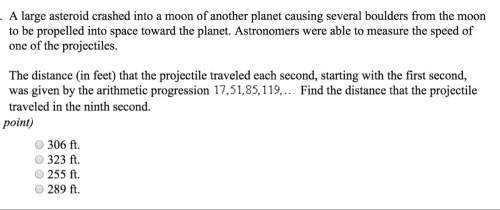
Mathematics, 19.11.2019 02:31 annabelle2516
Example 5 suppose that f(0) = −7 and f '(x) ≤ 8 for all values of x. how large can f(3) possibly be? solution we are given that f is differentiable (and therefore continuous) everywhere. in particular, we can apply the mean value theorem on the interval [0, 3] . there exists a number c such that f(3) − f(0) = f '(c) 3 correct: your answer is correct. − 0 so f(3) = f(0) + 3 correct: your answer is correct. f '(c) = −7 + 3 correct: your answer is correct. f '(c). we are given that f '(x) ≤ 8 for all x, so in particular we know that f '(c) ≤ 8 correct: your answer is correct. multiplying both sides of this inequality by 3, we have 3f '(c) ≤ 24 correct: your answer is correct. , so f(3) = −7 + incorrect: your answer is incorrect. f '(c) ≤ −7 + incorrect: your answer is incorrect. = incorrect: your answer is incorrect. the largest possible value for f(3) is .

Answers: 2


Another question on Mathematics

Mathematics, 21.06.2019 16:00
You eat 8 strawberries and your friend eats 12 strawberries from a bowl. there are 20 strawberries left. which equation and solution give the original number of strawberries?
Answers: 3

Mathematics, 21.06.2019 17:30
Determine the number of girls in a math class with 87 boys if there are 25 girls for every 75 boys
Answers: 2

Mathematics, 21.06.2019 18:00
Use the data on the dot plot to answer the question.how many people read for more than three hours last week? i'm on a unit test review
Answers: 1

You know the right answer?
Example 5 suppose that f(0) = −7 and f '(x) ≤ 8 for all values of x. how large can f(3) possibly be?...
Questions

Biology, 23.09.2019 15:10

Social Studies, 23.09.2019 15:10

Mathematics, 23.09.2019 15:10


History, 23.09.2019 15:10

Mathematics, 23.09.2019 15:10



History, 23.09.2019 15:10

History, 23.09.2019 15:10

History, 23.09.2019 15:10


Mathematics, 23.09.2019 15:10

Social Studies, 23.09.2019 15:10


Mathematics, 23.09.2019 15:10

Computers and Technology, 23.09.2019 15:10


Physics, 23.09.2019 15:10




